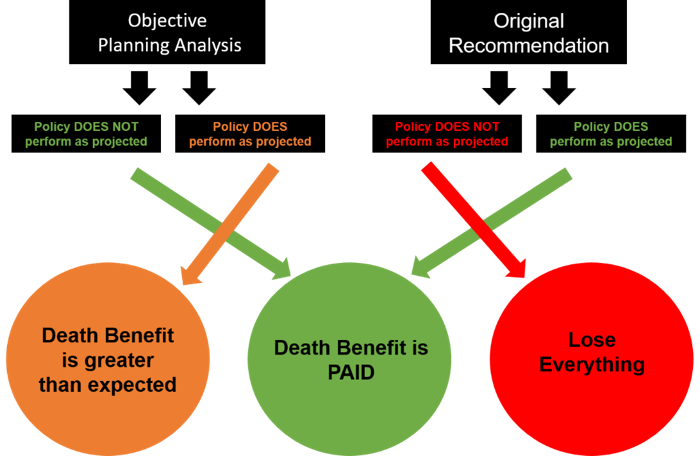All Categories
Featured
Table of Contents
1), usually in an attempt to defeat their group averages. This is a straw man debate, and one IUL people love to make. Do they contrast the IUL to something like the Vanguard Overall Stock Market Fund Admiral Show to no tons, an expenditure ratio (ER) of 5 basis points, a turn over proportion of 4.3%, and a phenomenal tax-efficient record of circulations? No, they contrast it to some horrible proactively managed fund with an 8% lots, a 2% EMERGENCY ROOM, an 80% turn over proportion, and a dreadful record of short-term funding gain distributions.
Mutual funds frequently make annual taxed distributions to fund proprietors, even when the worth of their fund has actually dropped in value. Mutual funds not only require earnings reporting (and the resulting yearly tax) when the mutual fund is rising in value, however can additionally enforce earnings taxes in a year when the fund has actually gone down in value.
That's not how common funds function. You can tax-manage the fund, harvesting losses and gains in order to reduce taxed circulations to the capitalists, however that isn't in some way mosting likely to change the reported return of the fund. Just Bernie Madoff types can do that. IULs prevent myriad tax traps. The possession of shared funds might require the common fund owner to pay projected taxes.

IULs are easy to place so that, at the owner's fatality, the beneficiary is exempt to either income or estate tax obligations. The exact same tax obligation decrease strategies do not function virtually as well with mutual funds. There are many, often expensive, tax obligation traps connected with the timed acquiring and selling of common fund shares, traps that do not relate to indexed life Insurance.
Chances aren't very high that you're going to go through the AMT as a result of your mutual fund circulations if you aren't without them. The rest of this one is half-truths at ideal. For example, while it is real that there is no income tax obligation as a result of your beneficiaries when they inherit the profits of your IUL policy, it is also true that there is no revenue tax obligation due to your successors when they inherit a mutual fund in a taxed account from you.
Ffiul Insurance
There are much better ways to stay clear of estate tax obligation concerns than purchasing financial investments with reduced returns. Shared funds might create revenue taxation of Social Safety benefits.

The development within the IUL is tax-deferred and may be taken as tax obligation cost-free revenue using finances. The plan proprietor (vs. the mutual fund supervisor) is in control of his or her reportable income, therefore allowing them to decrease and even eliminate the taxation of their Social Protection benefits. This one is fantastic.
Here's another very little issue. It holds true if you get a shared fund for say $10 per share prior to the distribution day, and it distributes a $0.50 circulation, you are after that mosting likely to owe taxes (most likely 7-10 cents per share) although that you have not yet had any kind of gains.
In the end, it's really regarding the after-tax return, not how much you pay in tax obligations. You're additionally most likely going to have more money after paying those taxes. The record-keeping needs for possessing common funds are dramatically a lot more intricate.
With an IUL, one's documents are maintained by the insurer, copies of yearly statements are sent by mail to the proprietor, and circulations (if any kind of) are amounted to and reported at year end. This set is likewise sort of silly. Certainly you should maintain your tax obligation documents in situation of an audit.
Universal Life Insurance For Business Owners
Hardly a factor to get life insurance policy. Mutual funds are generally component of a decedent's probated estate.
Additionally, they go through the hold-ups and costs of probate. The proceeds of the IUL plan, on the various other hand, is constantly a non-probate circulation that passes outside of probate directly to one's called recipients, and is for that reason exempt to one's posthumous financial institutions, unwanted public disclosure, or similar delays and costs.
Medicaid disqualification and life time earnings. An IUL can supply their proprietors with a stream of income for their entire life time, regardless of exactly how lengthy they live.

This is helpful when arranging one's affairs, and converting assets to revenue prior to a retirement home confinement. Shared funds can not be transformed in a comparable manner, and are often thought about countable Medicaid assets. This is one more stupid one supporting that bad people (you know, the ones that need Medicaid, a government program for the bad, to spend for their assisted living facility) must utilize IUL rather than mutual funds.
Master Iul
And life insurance coverage looks terrible when compared rather against a retirement account. Second, people who have money to buy IUL above and beyond their retirement accounts are going to need to be terrible at taking care of money in order to ever get Medicaid to spend for their assisted living home costs.
Persistent and incurable disease biker. All plans will certainly enable an owner's simple accessibility to cash money from their policy, commonly forgoing any kind of abandonment charges when such individuals experience a major disease, need at-home care, or come to be confined to a retirement home. Shared funds do not give a comparable waiver when contingent deferred sales costs still apply to a common fund account whose owner needs to market some shares to money the prices of such a remain.
Iul Result
Yet you reach pay even more for that advantage (rider) with an insurance plan. What a large amount! Indexed universal life insurance policy gives fatality benefits to the recipients of the IUL proprietors, and neither the owner nor the beneficiary can ever before lose money because of a down market. Shared funds provide no such assurances or survivor benefit of any kind.
I absolutely don't require one after I reach monetary self-reliance. Do I desire one? On average, a purchaser of life insurance coverage pays for the true cost of the life insurance advantage, plus the costs of the plan, plus the earnings of the insurance company.
Adjustable Life Insurance Vs Universal Life Insurance
I'm not completely sure why Mr. Morais tossed in the entire "you can't lose money" again right here as it was covered fairly well in # 1. He just wanted to repeat the very best marketing factor for these things I suppose. Once again, you do not lose nominal bucks, however you can lose real bucks, as well as face severe chance price because of reduced returns.
:max_bytes(150000):strip_icc()/pros-cons-indexed-universal-life-insurance.asp_v1-e119226901bc464593a496c003551ea0.png)
An indexed universal life insurance policy plan proprietor might trade their plan for a completely different plan without setting off revenue tax obligations. A shared fund owner can stagnate funds from one common fund company to an additional without marketing his shares at the previous (thus setting off a taxed event), and redeeming brand-new shares at the latter, frequently subject to sales charges at both.
While it is true that you can exchange one insurance coverage plan for an additional, the factor that individuals do this is that the very first one is such an awful plan that even after buying a brand-new one and going with the early, adverse return years, you'll still come out ahead. If they were offered the ideal plan the very first time, they should not have any wish to ever trade it and go with the very early, unfavorable return years once more.
Latest Posts
Minnesota Life Iul
Group Universal Life Cash Accumulation Fund
What Is Indexed Whole Life Insurance